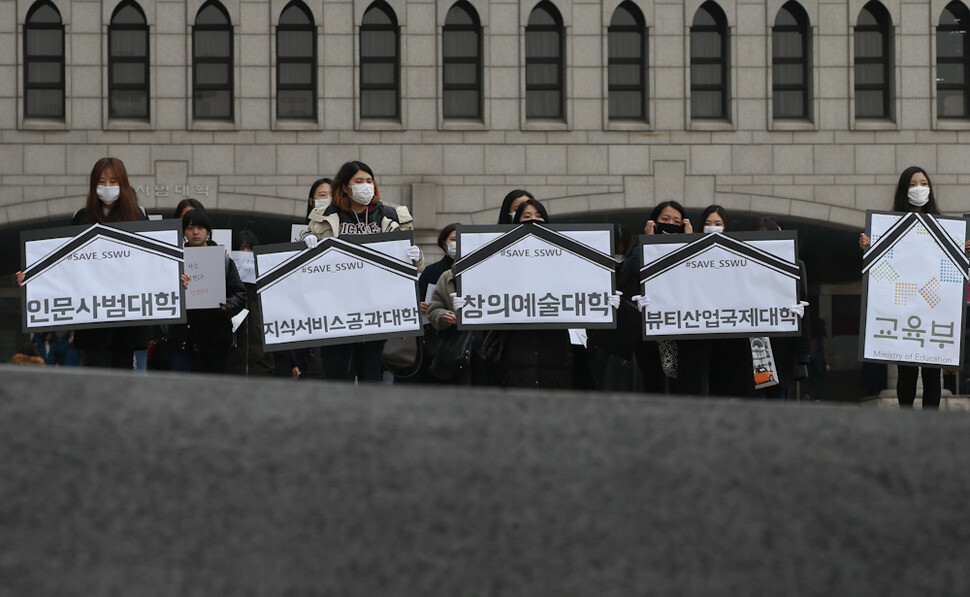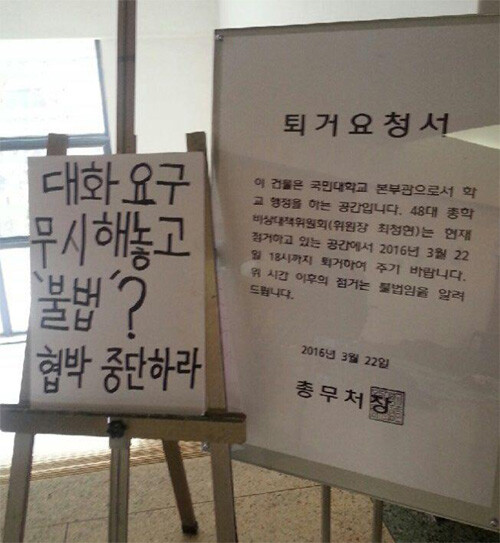hankyoreh
Links to other country sites 다른 나라 사이트 링크
University students resisting artificial, government-directed restructuring

University students are embarking on a coordinated response to restructuring imposed by universities and the Ministry of Education with a focus on “industry demand.”
As universities undertake department mergers and shutdowns, cuts to incoming class sizes, and other intensive restructuring to receive support from the ministry‘s PRIME and CORE efforts, many are demanding that the programs be ended or reconsidered - fearing infringements of academic autonomy and a decline in basic disciplines in the humanities, arts, and natural sciences.
The PRIME project, which is designed to foster leading universities in the promotion of industry-linked education, involves 600 billion won (US$519 million) in support over a three-year period, while the CORE effort to boost university humanities capabilities offers 180 billion won (US$156 million) over three years.
Student councils and student groups from seven Seoul-area universities staged a press conference in front of Seoul City Hall on Mar. 22 to demand an end to the PRIME and CORE projects and their full-scale reconsideration. Represented were Konkuk University, Kookmin University, Dankook University, Dongguk University, Sungshin Women’s University, Ewha Womans University, and Chung-Ang University.
Across the country, the academic community has been plagued by continued differences between universities and their faculty and students over the direction of restructuring since the ministry‘s final announcement of the PRIME and CORE projects last December. The PRIME project in particular seems to be sparking major disputes between the two sides due to the large amount of support and scale of cuts involved.
16 universities were selected by the government for the Core project on Mar. 17, while institutions have until the end of March to submit project plans for the PRIME project.

Conscious of the issues surrounding forced restructuring, the ministry has stressed autonomous decision-making by universities and a consensus among members as principles. But at most universities, those principles have been disregarded in favor of unilateral restructuring based on ministry guidelines. In most cases, the number of departments in engineering and “convergence” has been increased, while many in the humanities, natural sciences, and arts have been merged or shut down completely.
Kookmin University, which is currently planning to apply for the PRIME project, has recently treated a plan for the merging and discontinuation of colleges as a foregone conclusion. On Mar. 9 and 16, the university administration posted a “college restructuring” plan on the university website’s administrative announcement bulletin board. The plan would merge the forestry science and natural science colleges into a single “convergence science” college. Survey results showing 89.3% of forestry science students opposing the merger were ignored.
Professors and students have also vocally opposed a plan to turn the college of liberal arts and sciences into a “global humanities and regional studies college,” which would incorporate the Chinese studies major from the School of International and Area Studies (SIAS).
“We‘ve been expressing our opposition through surveys, signature campaigns, and assemblies, but nothing has changed from what was discussed by the ad hoc university affairs committee in January,” said the head of the Kookmin University student council’s emergency countermeasures committee.
On Mar. 22, the emergency committee began a protest to demand an end to the current restructuring measures and renewed discussion of the plan. An SIAS professor explained, “The school headquarters, and the university president in particular, are taking a ‘divide and conquer’ approach to departments with different development directions [interests].”
The professor also voiced fears that the approach could prove counterproductive.
“It would be terrific if this kind of restructuring led to better employment prospects, but weirdly named majors will just hurt the school’s prestige,” the professor said.
With less than ten days left before the deadline to submit to the ministry, many schools have not actually disclosed their restructuring plans for “management strategy” reasons. Konkuk University has gone ahead with restructuring without sharing the specifics with campus members.
“There was a round table where the vice president said, ’We won’t do it if the students are opposed,’ but it appears now that they‘re just going ahead with it,” said Lee Hye-yeon, a political science major and head of the university’s KU Hunter planning team.
At Kyung Hee University, discussions on the restructuring plan were started again from square one after student body objections prompted a full-scale reconsideration. But even the student council has not been notified of the plan’s specifics. The original plan would relocate 15% of the current incoming class, or 725 students, to other majors. For now, the student body is planning to continue discussions with the school.
“South Korea already has an excessively high rate of engineering and medical majors compared to other countries,” noted the Korea Higher Education Research Institute (KHEI).
“Forcible academic restructuring by the government that do not accord with global trends could result in a greater workforce supply imbalance and greater uniformity of universities in the long term,” it added.
KHEI went on say that the ministry’s support projects “are sending the message that because the administration and companies aren’t succeeding in creating a positive feedback loop of economic growth, job creation, and increased employment, the universities should take it on themselves to create a positive feedback loop of restructuring, reduced employment mismatching, and greater employment.”
“We can’t solve the youth unemployment problem unless the administration and companies establish a positive feedback loop with job creation,” it continued.
By Choi Woo-ri, Kim Mee-hyang, Park Su-ji and Ko Han-sol, staff reporters
Please direct questions or comments to [english@hani.co.kr]

Editorial・opinion
![[Column] Season 2 of special prosecutor probe may be coming to Korea soon [Column] Season 2 of special prosecutor probe may be coming to Korea soon](https://flexible.img.hani.co.kr/flexible/normal/500/300/imgdb/original/2024/0426/3317141030699447.jpg) [Column] Season 2 of special prosecutor probe may be coming to Korea soon
[Column] Season 2 of special prosecutor probe may be coming to Korea soon![[Column] Park Geun-hye déjà vu in Yoon Suk-yeol [Column] Park Geun-hye déjà vu in Yoon Suk-yeol](https://flexible.img.hani.co.kr/flexible/normal/500/300/imgdb/original/2024/0424/651713945113788.jpg) [Column] Park Geun-hye déjà vu in Yoon Suk-yeol
[Column] Park Geun-hye déjà vu in Yoon Suk-yeol- [Editorial] New weight of N. Korea’s nuclear threats makes dialogue all the more urgent
- [Guest essay] The real reason Korea’s new right wants to dub Rhee a founding father
- [Column] ‘Choson’: Is it time we start referring to N. Korea in its own terms?
- [Editorial] Japan’s rewriting of history with Korea has gone too far
- [Column] The president’s questionable capacity for dialogue
- [Column] Are chaebol firms just pizza pies for families to divvy up as they please?
- [Column] Has Korea, too, crossed the Rubicon on China?
- [Correspondent’s column] In Japan’s alliance with US, echoes of its past alliances with UK
Most viewed articles
- 1‘We must say no’: Seoul defense chief on Korean, USFK involvement in hypothetical Taiwan crisis
- 2[Column] Season 2 of special prosecutor probe may be coming to Korea soon
- 3N. Korean delegation’s trip to Iran shows how Pyongyang is leveraging ties with Moscow
- 4Amnesty notes ‘erosion’ of freedom of expression in Korea in annual human rights report
- 5Korea sees more deaths than births for 52nd consecutive month in February
- 6[Reportage] On US campuses, student risk arrest as they call for divestment from Israel
- 7[Editorial] New weight of N. Korea’s nuclear threats makes dialogue all the more urgent
- 8‘Weddingflation’ breaks the bank for Korean couples-to-be
- 9Division commander ordered troops to enter raging flood waters before Marine died, survivor says
- 10[Editorial] Korea’s surprise Q1 growth requires objective assessment, not blind fanfare